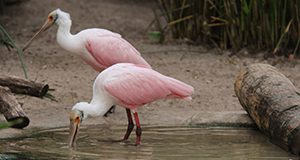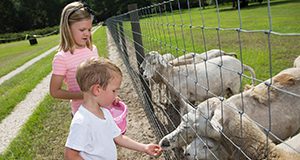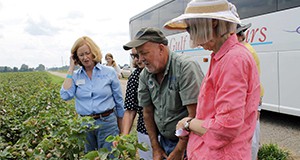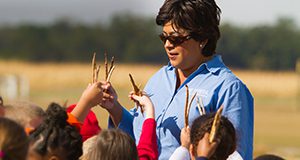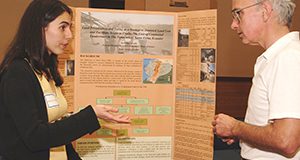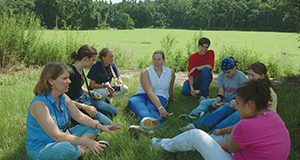As Extension turns more to effecting behavior change beyond simply raising awareness or understanding concerns, how do we not only help clientele make a change, but make it easier? Behavioral economics principles can improve the way we present options to clients, increasing the likelihood of them choosing desirable behaviors. This new 3-page publication of the UF/IFAS Department of Agricultural Education and Communication offers an introduction to these concepts as well as practical strategies for setting up the environment for change. Written by Laura Warner, Kathryn Stofer, and Hayk Khachatryan.
https://edis.ifas.ufl.edu/wc343
Tag: Kathryn Stofer
Preparing for One-on-One Qualitative Interviews: Logistics
This new 4-page publication provides an introduction for researchers and evaluators wishing to use qualitative methods of interviews and focus groups. The document covers a short background on qualitative methods versus quantitative methods and offers practical tips on piloting your questions, preparing your materials, and conducting the interview or focus group. Written by Kathryn A. Stofer and published by the UF/IFAS Department of Agricultural Education and Communication, this EDIS article is designed to accompany AEC675, Preparing for One-on-One Qualitative Interviews: Designing and Conducting the Interview.
https://edis.ifas.ufl.edu/wc339
Preparing for One-on-One Qualitative Interviews: Designing and Conducting the Interview
This new 4-page document provides instructions on designing the question guide and conducting one-on-one interviews for qualitative data collection. It covers common types of interviews and their uses as well as strategies to use when asking the questions of the interviewee. This document is designed to accompany AEC676, Preparing for One-on-One Qualitative Interviews: Logistics. Written by Kathryn A. Stofer and published by the UF/IFAS Department of Agricultural Education and Communication.
https://edis.ifas.ufl.edu/wc338
BioBlitzes: Citizen Science for Biodiversity in Florida
This 5-page fact sheet written by Mathieu Basille and Kathryn Stofer and published by the UF/IFAS Wildlife Ecology and Conservation Department is the first of a series designed to help Extension faculty and others interested in hosting citizen-science events known as BioBlitzes. Together, these documents will assist organizers in launching events in their regions, recruiting participants, and sustaining the program over time. This document will focus on the background and purpose of BioBlitzes to help these hosts understand and share with potential participants and other stakeholders the importance and value of the events. Other documents will focus on the details of organizing the events and, for participants, why and how they can get involved.
http://edis.ifas.ufl.edu/uw449
Helping Agritourism Visitors Learn During Their Visits
Agritourism is a growing industry in Florida, and combines two of the state’s major assets: tourism and agriculture. This 4-page document outlines ways that agritourism operators can incorporate meaningful educational opportunities into their operation. Written by Kathryn Stofer and Joy N. Rumble and published by the UF/IFAS Department of Agricultural Education and Communication, June 2018.
http://edis.ifas.ufl.edu/wc308
Selecting the Right Type of Educational Experience for Your Agritourism Operation
Agritourism has become a way for consumers to experience agriculture and for the industry to increase agricultural awareness. This 4-page document will help guide you toward selecting the right type of educational experience for your agritourism operation. Written by Joy N. Rumble, Kathryn Stofer, and Hoda Manafian Ghahfarokhi and published by the UF/IFAS Department of Agricultural Education and Communication, May 2018.
http://edis.ifas.ufl.edu/wc304
Getting Engaged: Program and Event Planning for Clients with Diverse Abilities
For event planners, it is important to be inclusive of people with diverse physical and mental abilities when establishing accommodations for programs or events. This 3-page publication is one in the series Getting Engaged, and will aid Extension professionals and other program/event planners in appropriately accommodating audiences and attendees with various needs. Written by Kathryn Stofer and published by the UF/IFAS Department of Agricultural Education and Communication, March 2018.
http://edis.ifas.ufl.edu/wc299
Peach Consumption: A Profile of Purchasers and Non-Purchasers
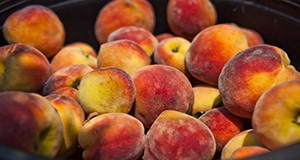
Peaches are among the most commonly produced fruits in the United States; understanding consumer awareness, perceptions, and preferences regarding Florida peaches is important to the future of the industry. This 5-page document addresses consumers’ perceptions of Florida peaches, purchasing motivations and barriers, preferred packaging options and opportunities, purchasing locations, and knowledge of peach health benefits. Written by Joy Rumble, Kara Harders, and Kathryn Stofer and published by the UF/IFAS Department of Agricultural Education and Communication, December 2017.
http://edis.ifas.ufl.edu/wc288
Florida Peaches: A Perfect Snack
The growing conditions in Florida have given Florida-grown peaches unique characteristics that make them an ideal springtime snack. This 3-page document discusses the characteristics, health benefits, purchase, and storage of Florida peaches. Written by Joy Rumble, Kara Harders, and Kathryn Stofer and published by the UF/IFAS Department of Agricultural Education and Communication, November 2017.
http://edis.ifas.ufl.edu/wc287
Florida's Agritourism Laws
Agritourism combines tourism and agriculture, Florida’s two largest industries, to provide interactive, engaging, and educational experiences for the public. This four-page document describes the laws governing Florida agritourism operations. Written by Mary Beth Henry and Kathryn Stofer and published by UF’s Department of Agricultural Education and Communication, September 2017.
http://edis.ifas.ufl.edu/wc285
Getting Engaged: Resources to Support Community Engagement Practices
This document is part of a series called Getting Engaged (http://edis.ifas.ufl.edu/topic_series_getting_engaged), designed to help Extension and research faculty and other community engagement professionals improve their engagement with a variety of stakeholder audiences. This four-page document offers resources for practitioners at all stages, from those just beginning to think about engagement to those who have been engaging their communities for years. Written by Kathryn A. Stofer and published by the Department of Agricultural Education and Communication.
http://edis.ifas.ufl/edu/wc273
Getting Engaged: Improving Your Stakeholder Engagement Practices
This document is part of a series called Getting Engaged (http://edis.ifas.ufl.edu/topic_series_getting_engaged), designed to help Extension and research faculty and other community engagement professionals improve their engagement with a variety of stakeholder audiences. This four-page document provides basic information that will help faculty and other community professionals become more comfortable with engaging various stakeholder audiences. Written by Kathryn A. Stofer and published by the Department of Agricultural Education and Communication.
http://edis.ifas.ufl.edu/wc274
Getting Engaged: Public Engagement Practices for Researchers
A part of the Getting Engaged series that aims to help readers become more comfortable with engaging various stakeholder audiences, this five-page fact sheet is designed for agriscience, natural resources, or other science and engineering faculty with primarily natural or physical science backgrounds who want to get started in stakeholder engagement. Written by Kathryn A. Stofer and published by the Department of Agricultural Education and Communication.
http://edis.ifas.ufl.edu/wc272
Promoting Ag Awareness through Commodity Fact Sheets
Increasing public awareness of Florida agriculture is a vital step in motivating the public to support agriculture. A basic understanding of Florida’s agricultural products, their impacts on the economy and the environment, and their availability contributes to Extension’s mission to sustain and enhance quality of life. This three-page publication outlines a series of fact sheets with infographics related to specific Florida agricultural commodities. These fact sheets are intended to be visually appealing while presenting an overview of the commodity and its role in Florida agriculture. Written by Kathryn A. Stofer, Jessica Sullivan, Joy Rumble, and Libbie Johnson and published by the Department of Agricultural Education and Communication.
http://edis.ifas.ufl.edu/wc253
Understanding Ag Awareness Programming throughout UF/IFAS Extension: Supporting Citizen Awareness of Food Systems and the Environment
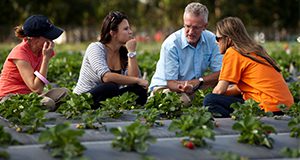
Florida Extension agents around the state are working to increase public agricultural awareness (Ag Awareness). This five-page fact sheet outlines FLorida’s recent Extension efforts in agricultural awareness and highlight future directions to coordinate and strengthen this work, offering ideas for best practices while avoiding unnecessary duplication. Written by Joy N. Rumble, Kathryn A. Stofer, and Libbie Johnson and published by the Department of Agricultural Education and Communication.
http://edis.ifas.ufl.edu/wc168
Emphasizing the Science, Technology, Engineering, and Math (STEM) in Agricultural Extension
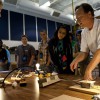 STEM is an acronym for science, technology, engineering, and math. In Extension, our purpose is to share the knowledge or products created through Ag-STEM research and design by universities and government agencies. Finding effective solutions to agricultural issues, especially in urban areas, increasingly involves working with clientele to solve problems jointly. Therefore, emphasizing the connections of STEM to agricultural problems through Ag-Extension programming can help our public audiences comprehend the problem-solving system underlying the content. The goal is to provide public audiences with self-confidence and skills in STEM, preparing them to be more engaged in the problem-solving process for the challenges ahead. This 5-page fact sheet was written by Kathryn A. Stofer, Laura A. Warner, and Steven Arthurs, and published by the UF Department of Agricultural Education and Communication, October 2014. (UF/IFAS photo by Tyler Jones.)
STEM is an acronym for science, technology, engineering, and math. In Extension, our purpose is to share the knowledge or products created through Ag-STEM research and design by universities and government agencies. Finding effective solutions to agricultural issues, especially in urban areas, increasingly involves working with clientele to solve problems jointly. Therefore, emphasizing the connections of STEM to agricultural problems through Ag-Extension programming can help our public audiences comprehend the problem-solving system underlying the content. The goal is to provide public audiences with self-confidence and skills in STEM, preparing them to be more engaged in the problem-solving process for the challenges ahead. This 5-page fact sheet was written by Kathryn A. Stofer, Laura A. Warner, and Steven Arthurs, and published by the UF Department of Agricultural Education and Communication, October 2014. (UF/IFAS photo by Tyler Jones.)
http://edis.ifas.ufl.edu/wc184
Extension Professionals: Anticipating and Solving Common Challenges in Planning and Delivering Educational Programs
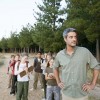 The work of an Extension agent demands much more than just subject knowledge. An Extension career is exciting because no two days are the same. With that comes a variety of unexpected challenges. The delivery of programs to diverse clienteles is, in itself, a skill and something that Extension agents improve over time. This article summarizes some common problems associated with delivering Extension programs and to recommend solutions. This 5-page fact sheet was written by Laura A. Warner and Kathryn A. Stofer, and published by the UF Department of Agricultural Education and Communication, September 2014.
The work of an Extension agent demands much more than just subject knowledge. An Extension career is exciting because no two days are the same. With that comes a variety of unexpected challenges. The delivery of programs to diverse clienteles is, in itself, a skill and something that Extension agents improve over time. This article summarizes some common problems associated with delivering Extension programs and to recommend solutions. This 5-page fact sheet was written by Laura A. Warner and Kathryn A. Stofer, and published by the UF Department of Agricultural Education and Communication, September 2014.
http://edis.ifas.ufl.edu/wc178
Visualizing Spatially Based Data for Various Stakeholder Audiences
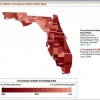 The work of Extension professionals is often to translate complex research findings into practical recommendations. One of the tools used for communicating with Extension audiences is visual representation of data. These visualizations include graphs, charts, and data overlaid onto maps. Just as text and words must be thoughtfully prepared for broad understanding, images should be adapted from the forms used with highly knowledgeable audiences. This 6-page fact sheet summarizes research in science communication and education that offers strategic ways for communicators to revise data visualizations for broad meaning-making. Written by Kathryn Stofer, and published by the UF Department of Agricultural Education and Communication, May 2014.
The work of Extension professionals is often to translate complex research findings into practical recommendations. One of the tools used for communicating with Extension audiences is visual representation of data. These visualizations include graphs, charts, and data overlaid onto maps. Just as text and words must be thoughtfully prepared for broad understanding, images should be adapted from the forms used with highly knowledgeable audiences. This 6-page fact sheet summarizes research in science communication and education that offers strategic ways for communicators to revise data visualizations for broad meaning-making. Written by Kathryn Stofer, and published by the UF Department of Agricultural Education and Communication, May 2014.
http://edis.ifas.ufl.edu/wc163


